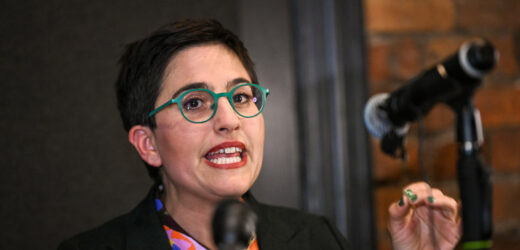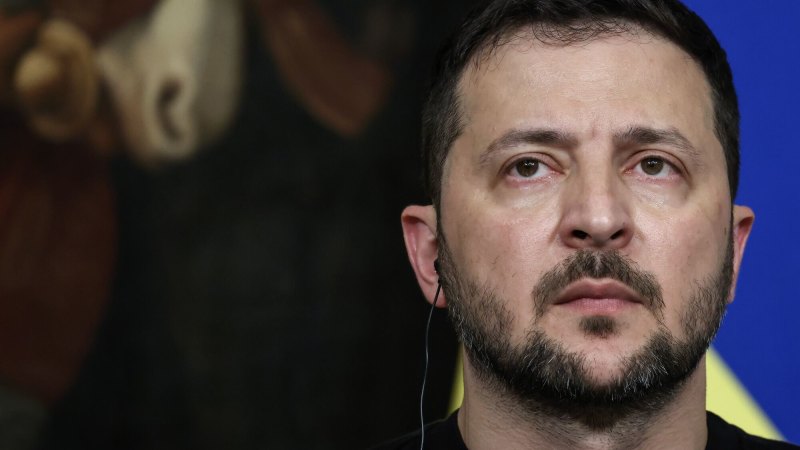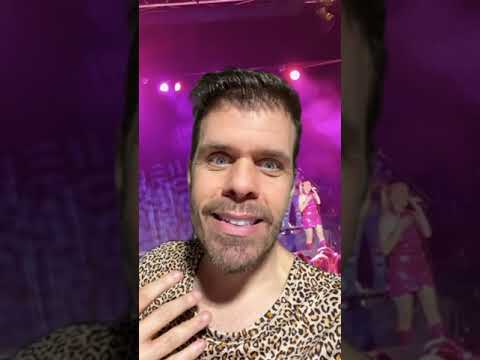Save articles for later
Add articles to your saved list and come back to them any time.
The Greens will table a draft law on Monday they say will strengthen protections for transgender Victorians and pressure the Andrews government to expedite an anti-vilification overhaul following the targeting of drag story-time events in Melbourne.
The bill is likely to reignite a debate over the line between free speech and hate speech at a time when the Greens and Liberal Party are grappling with these issues within their own ranks.
Greens LGBTQ spokesperson Gabrielle de Vietri.Credit: Justin McManus
The government has hit back at the Greens’ push, arguing genuine reform takes time and should not be rushed.
Greens LGBTQ spokesperson Gabrielle de Vietri said her bill took inspiration from former Reason MP Fiona Patten’s failed anti-vilification bill, which would have added sexist and homophobic abuse to current racial and religious discrimination protections. That draft law attracted fierce opposition from religious conservatives, libertarians and some feminists in 2019.
Ultimately, Labor did not back Patten’s bill amid fears the wording was too subjective and would leave individuals open to vexatious litigation.
But de Vietri said now was the time to expand Victoria’s religious and racial anti-vilification laws to protect people on the grounds of their gender, sexuality, HIV status or disability.
“This bill has been long overdue,” she said. “The kind of things we’ve seen in the last few months from the far right have been really scary. The time to act is right now to be able to put in place protections, especially for trans and gender-diverse people.”
The Richmond MP said parliament held an inquiry on this issue in 2020 and by the following year the government offered in-principle support to expanding anti-vilification laws.
“What is the government waiting for? We’ve seen in the last few months that far-right groups are organising and growing. We can’t keep dragging our heels while neo-Nazis send threats of violence to libraries for holding inclusive family-friendly events.”
Attorney-General Jaclyn Symes, who is responsible for anti-vilification reform, said the government would act this year. She said she planned to not just add to the existing legislation, but make it work for the religious and racial groups already covered by the laws who say the current system isn’t working.
“If I thought a stroke of a pen would stop horrible people causing fear in minority groups, then of course I would have done that,” the attorney-general said. “But you can’t legislate without consultation in this incredibly complex area of law.”
Earlier this year, the Andrews government committed to banning the Nazi salute. Regarding fresh anti-vilification laws, the government is – among other reforms – working to ensure that people living with Tourette syndrome aren’t captured by any future overhaul.
“We won’t be rushed by those trying to score cheap political points over this issue,” Symes said. “We’ll continue to work closely with multicultural and faith communities, members of the LGBTIQ+ community and advocates to get this law right.”
Upper house Liberal MP Evan Mulholland referenced Patten’s original plan to overhaul the state’s anti-vilification laws in his first speech, saying it should “never again see the light of day”.
Victorian Attorney-General Jaclyn Symes.Credit: Chris Hopkins
“Laws on speech with ridiculously low thresholds, like being ‘likely to’ cause offence, should be consigned to the dustbin of history,” he said.
Mulholland declined to comment further when contacted by The Age. Asked whether the Greens bill would capture behaviour that is “likely to” cause offence, de Vietri said she was open to lowering the threshold of what constitutes vilification if that’s what the community wanted.
“We would welcome constructive discussion with the government about the legislation,” she said.
The Greens’ push comes after the party broadened the definition of transphobia in its code of conduct, a move some in the party have said goes too far and prescribes gender-critical speech. Others have lauded the new policy, saying it offers members the strongest protections of any Australian political party.
About half of Victorian Greens state council members are up for re-election, with a small bloc who are either trans-exclusionary feminists – or those who support them on freedom-of-speech grounds – hoping to retain their numbers or even grow their ranks come July.
The Victorian Liberal Party has also grappled with what some feminists say is a clash between the rights of transgender women and non-transgender women, and when their actions and beliefs may cross a line.
Last week, state MPs voted to expel Moira Deeming from the Liberal party room. The upper house MP will now sit on the crossbench permanently after initially copping a nine-month suspension.
Deeming’s move to the crossbench was triggered by her attendance at the Let Women Speak rally on the steps of state parliament in March. The anti-transgender rights rally was gatecrashed by neo-Nazis who, among other things, held a sign that said “destroy paedo freaks”.
Deeming has sent a defamation concerns notice to Opposition Leader John Pesutto and says she abhors neo-Nazis.
Earlier this month, Monash City Council cancelled a drag story-time event after threats of violence against families, the performer, councillors and staff.
The Morning Edition newsletter is our guide to the day’s most important and interesting stories, analysis and insights. Sign up here.
Most Viewed in Politics
From our partners
Source: Read Full Article




